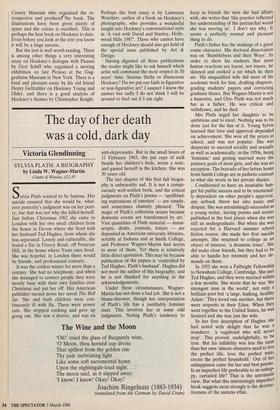The day of her death was a cold, dark day
Victoria Glendinning
SYLVIA PLATH: A BIOGRAPHY by Linda W. Wagner-Martin
Chatto & Windus, £12.95
Sylvia Plath wanted to be famous. Her suicide ensured that she would be, what- ever posterity's judgment was on her poet- ry; but that was not why she killed herself. Just before Christmas 1962 she came to London with her two small children from the house in Devon where she lived with her husband Ted Hughes, from whom she was separated. Lonely and vulnerable, she found a flat in Fitzroy Road, off Primrose Hill, in the house where Yeats once lived. She was hopeful; in London there would be friends, and professional contacts.
It was the coldest winter for more than a century. She had no telephone, and when she managed to contact people they were mostly busy with their own families over Christmas and put her off. Her American publisher turned down her novel The Bell Jar. She and both children were con- tinuously ill with flu. There were power cuts. She stopped cooking and gave up going out. She saw a doctor, and was on anti-depressants. But in the small hours of 11 February 1963, she put cups of milk beside her children's beds, wrote a note, and gassed herself in the kitchen. She was 30 years old. The last chapter of this first full biogra- phy is unbearably sad. It is not a conspi- cuously well-written book, and the critical judgments on Plath's poems — 'spellbind- ing expressions of emotion' — are simple, and sometimes clumsily phrased: 'The magic of Plath's collection occurs because domestic events are transformed by art.' Vast quantities of Plath material — manu- scripts, drafts, journals, letters — are deposited in American university libraries, notably at Indiana and at Smith College, and Professor Wagner-Martin had access to most of them. Yet there is relatively little direct quotation. This may be because publication of the papers is 'controlled by Ted Hughes, Plath's husband'. Hughes did not meet the author of this biography, and he is not thanked for anything in the acknowledgements.
Under these circumstances, Wagner- Martin has not done a bad job. She is not a blame-thrower, though her interpretation of Plath's life has a justifiably feminist slant. This involves her in some odd judgments. Noting Plath's tendency to keep as friends the men she had affairs with, she writes that 'this practice reflected her understanding of the patriarchal world she was moving in'. I don't see why. It seems a perfectly normal and pleasant thing to do.
Plath's father has the makings of a great comic character. His doctoral dissertation was on 'Bumblebees and their Ways'. In order to show his students that most human reactions are learnt, not innate, he skinned and cooked a rat which he then ate. His unqualified wife did most of his academic work for him, drafting chapters, grading students' papers and correcting graduate theses. But Wagner-Martin is not a humorist, and Otto Plath was not much fun as a father. He was critical and withdrawn, and he died.
Mrs Plath urged her daughter to be ambitious and to excel. Nothing was to be done just for the fun of it. Young Sylvia learned that love and approval depended on achievement. She won all the prizes at school, and was not popular. She was desperate to succeed socially and sexually as well as academically; in the 1950s, being `feminine' and getting married were the primary goals of most girls, and she was no exception. The bravado of her letters home from Smith College are in pathetic contrast to what she wrote in her private diaries.
Conditioned to have an insatiable hun- ger for public success and to be emotional- ly dependent on other people's approval, any setback threw her into panic and despair. She was astonishingly successful as a young writer, having poems and stories published in the best places when she was still an undergraduate. But when she was rejected for a Harvard summer school fiction course, she made her first suicide attempts. She returned to college as an object of interest, 'a dramatic loner'. She did make close friends, but they had to be able to handle her intensity and her de- mands on them.
In 1955 she won a Fulbright Fellowship to Newnham College, Cambridge. She met Ted Hughes, and they were married within a few months. She wrote that he was 'the strongest man in the world', not only a brilliant poet but 'a large, hulking, healthy Adam.' They loved one another, but there were serpents in their Eden. When they went together to the United States, he was lionised and she was just the wife. In her first description of Hughes she had noted with delight that he was a wanderer, 'a vagabond who will never stop'. This proved, undelightfully, to be true. But his infidelity was less the issue than her own 'almost obsessive need to live the perfect life, love the perfect man, create the perfect household.' Out of her unhappiness came the last and best poems. Is an imperfect life preferable to an unbar py, curtailed life? That is the unromatic view. But what this interestingly imperfect book suggests most strongly is the destruc- tiveness of the success ethic.


















































 Previous page
Previous page